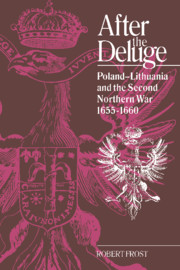Book contents
- Frontmatter
- Contents
- Preface
- Gazeteer
- Glossary
- Office holders
- List of abbreviations
- Pronunciation guide
- Genealogical tables
- Maps
- 1 Introduction: Poland—Lithuania in the midseventeenth century
- 2 The Deluge
- 3 Recovery: July 1655-August 1656
- 4 The widening conflict: June-December 1656
- 5 Constructing a coalition: January-December 1657
- 6 The succession and the failure of the coalition: January—July 1658
- 7 Political reform
- 8 Towards a French candidature: 1658–1660
- 9 Conclusion: the succession and the failure of reform
- Bibliography
- Index
- CAMBRIDGE STUDIES IN EARLY MODERN HISTORY
Preface
Published online by Cambridge University Press: 04 November 2009
- Frontmatter
- Contents
- Preface
- Gazeteer
- Glossary
- Office holders
- List of abbreviations
- Pronunciation guide
- Genealogical tables
- Maps
- 1 Introduction: Poland—Lithuania in the midseventeenth century
- 2 The Deluge
- 3 Recovery: July 1655-August 1656
- 4 The widening conflict: June-December 1656
- 5 Constructing a coalition: January-December 1657
- 6 The succession and the failure of the coalition: January—July 1658
- 7 Political reform
- 8 Towards a French candidature: 1658–1660
- 9 Conclusion: the succession and the failure of reform
- Bibliography
- Index
- CAMBRIDGE STUDIES IN EARLY MODERN HISTORY
Summary
There is no satisfactory solution to the problem of personal and place names in a work in English on east European history. I have tried to balance the conflicting claims of consistency and comprehensibility for readers unacquainted with east European languages. With regard to personal names, where an adequate English equivalent exists I have used it for the first names of ruling princes and members of royal families. Otherwise I use the Polish, German, Ukrainian, or Russian form where appropriate. I have used transliterations from Ukrainian rather than the Polish form for the names of Cossack leaders, thus Khmelnytskyi, not Chmielnicki; Vyhovskyi, not Wychowski. With regard to place names, wherever possible I have used the modern English equivalent, the seventeenth-century English equivalent for place names no longer used (for example Samogitia for Żmudż) or the form most familiar to English-speaking readers. On occasion this means preferring a Russian to a Polish, Belorussian, or Ukrainian form: thus Mogilev, not Mahiliou; Chernigov, not Chernihiv; and Brest (Litovsk) for Brześć Litewski. With regard to cities and provinces whose cultural and ethnic composition has changed radically I have preferred as far as possible the form used by the dominant linguistic group in the seventeenth century. Thus, for places in Prussia and Silesia German has been preferred: Danzig, not Gdańsk; Thorn, not Toruń; Breslau, not Wroclaw.
- Type
- Chapter
- Information
- After the DelugePoland-Lithuania and the Second Northern War, 1655–1660, pp. xi - xiiPublisher: Cambridge University PressPrint publication year: 1993

